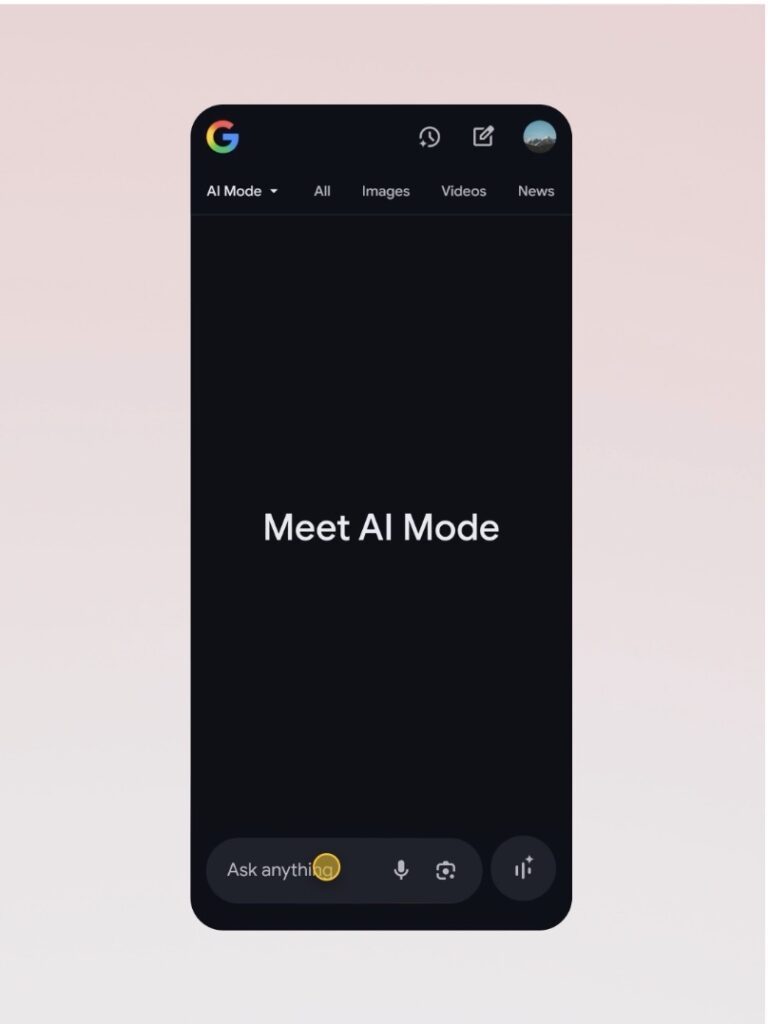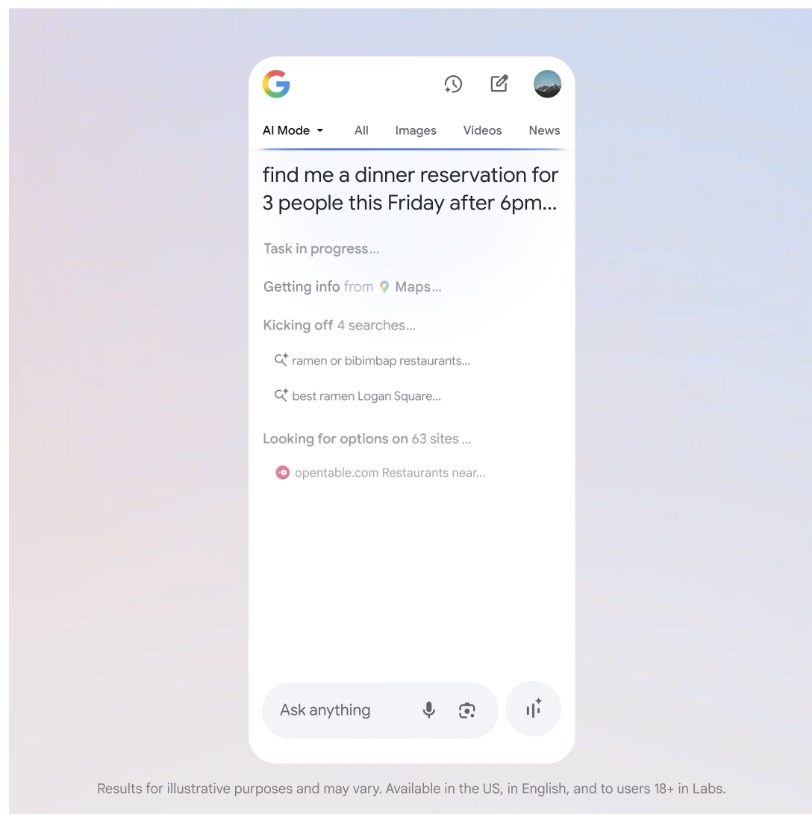Revolutionizing How We Search: From Casual Queries to Personalized Bookings and Collaborative Planning
- Global Reach Unlocked: Google’s AI Mode expands to 180 new countries in English, bringing its advanced, conversational search capabilities beyond the US, UK, and India, with plans for more languages soon.
- Agentic Superpowers Added: Subscribers can now book restaurant reservations tailored to specific preferences like party size, date, time, location, and cuisine, with future expansions to local services and event tickets—all powered by integrations with platforms like OpenTable and Resy.
- Personalization and Collaboration Boost: AI Mode now delivers customized results based on users’ past interactions and allows easy sharing of conversations for group planning, starting with dining topics in the US.
Google’s AI Mode is evolving from a simple search enhancer into a full-fledged digital assistant, poised to transform how billions interact with information online. Announced on Thursday, this update marks a significant leap in Google’s AI strategy, blending global accessibility with cutting-edge features that make searches more intuitive, personalized, and actionable. As AI continues to reshape the tech landscape, this expansion underscores Google’s push to stay ahead in a competitive field dominated by rivals like OpenAI and Microsoft. By integrating agentic capabilities—where AI doesn’t just answer questions but takes proactive steps like booking reservations—Google is bridging the gap between query and real-world action, potentially changing everything from daily errands to vacation planning.

At the heart of this rollout is the global expansion of AI Mode, which allows users to pose complex questions and follow-ups directly within Google Search. Previously limited to users in the US, UK, and India, the feature is now rolling out to 180 additional countries and territories, all in English for starters. This means more people worldwide can engage in a chatbot-like interface to dig deeper into topics, whether researching history, troubleshooting tech issues, or exploring hobbies. Google has teased that support for more languages and regions is on the horizon, signaling a commitment to inclusivity in an increasingly connected world. This move isn’t just about reach; it’s about democratizing advanced AI tools, making them available to diverse populations who might otherwise be left behind in the AI revolution.
One of the most exciting additions is the introduction of agentic features, starting with restaurant reservations. For Google AI Ultra subscribers in the US—those paying the premium $249.99 per month—this capability is accessible through the “Agentic capabilities in AI Mode” experiment in Google’s Labs. Users can request reservations with granular details: specify party size, preferred date and time, location, and cuisine type. AI Mode then scours real-time availability across multiple platforms, including OpenTable, Resy, Tock, Ticketmaster, StubHub, SeatGeek, and Booksy. It curates a list of matching options, complete with direct links to booking pages, streamlining what could otherwise be a tedious process of jumping between apps and websites. Looking ahead, Google plans to extend this to finding local service appointments and event tickets, turning AI Mode into a versatile booking agent that handles everything from haircuts to concert seats.
Personalization takes center stage in this update, making AI Mode feel like a tailored concierge rather than a generic search engine. Available to US users in the AI Mode Labs experiment, this feature initially focuses on dining-related queries. By analyzing past conversations, along with places searched or clicked in Google Search and Maps, AI Mode infers preferences to deliver hyper-relevant suggestions. For instance, if you query, “I only have an hour, need a quick lunch spot, any suggestions?” it might prioritize Italian eateries with outdoor seating if that’s what your history indicates you enjoy. This isn’t guesswork—it’s data-driven insight, but Google emphasizes user control: you can tweak personalization settings in your Google Account to opt out or adjust what’s considered. In a broader sense, this personalization reflects a shift toward “agentic AI,” where systems anticipate needs based on context, raising intriguing questions about privacy and the balance between convenience and data usage in our digital lives.

Collaboration gets a boost too, with a new “Share” button that lets users send AI Mode responses to others via a link. This allows friends or family to jump into the conversation and build on it—perfect for scenarios like planning a trip, organizing a birthday party, or coordinating group dinners. You can view and delete shared links anytime, adding a layer of flexibility and security. This feature highlights AI Mode’s potential as a social tool, fostering teamwork in an era where remote collaboration is the norm. Imagine starting a search for vacation spots, sharing it with your travel buddies, and having them add their own queries seamlessly—it’s a small but powerful step toward making AI a group activity.
From a broader perspective, these enhancements position Google AI Mode as a frontrunner in the race to integrate AI deeply into everyday tools. As competitors like Bing’s AI features or ChatGPT‘s search integrations gain traction, Google’s focus on practical, agentic functionalities—coupled with its massive user base—could redefine search engines as proactive helpers rather than passive databases. However, challenges remain: the high cost of the Ultra plan might limit access to these premium features, and expanding to more languages will be crucial for true global equity. Still, with its blend of personalization, sharing, and real-world utility, AI Mode isn’t just getting smarter—it’s becoming an indispensable part of how we navigate the world. As Google continues to iterate, users can expect even more ways to turn searches into seamless experiences, blurring the lines between asking a question and getting things done.
